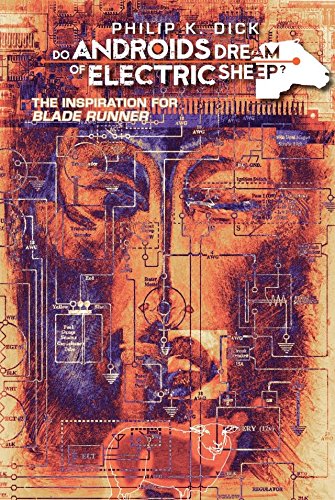Author: Philip K. Dick
Rating: 4/5
Last Read: November 2014
Who Should Read: Sci-fi fans, people who liked the movie Blade Runner
Do Androids Dream of Electric Sheep?, like many other Philip K. Dick stories, inspired the movie Blade Runner. Unlike the other movies-inspired-by-stories, Do Androids Dream of Electric Sheep? is a full novel, though you might find yourself finishing it in a single sitting as if it were a short story.
The novel and the movie are markedly different, but do share similarities. The main plot still follows a bounty hunter, Rick Deckard, who is tasked with retiring escaped androids. As with most Philip K. Dick stories, there is an exploration of an underlying theme about what it means to be human.
Do Androids Dream of Electric Sheep? is an excellent entry point into the work of Philip K. Dick. You won’t be disappointed.
It is no good. I can’t do it. I can play the Thirteen Ways of Looking at a Trash Compactor Repairman Game, but I cannot turn it into a story at once puzzling, poignant, grotesque, philosophical, satirical, and fun. There is a very special way of doing this and the first step in its mastery involves being Philip K. Dick.
My Highlights
Empathy, evidently, existed only within the human community, whereas intelligence to some degree could be found throughout every phylum and order including the arachnida.
Because, ultimately, the empathic gift blurred the boundaries between hunter and victim, between the successful and the defeated. As in the fusion with Mercer, everyone ascended together
The tyranny of an object, he thought. It doesn’t know I exist. Like the androids, it had no ability to appreciate the existence of another.
But maybe she doesn’t know how to cook, he thought suddenly. Okay, I can do it; I’ll fix dinner for both of us. And I’ll show her how so she can do it in the future if she wants. She’ll probably want to, once I show her how; as near as I can make out, most women, even young ones like her, like to cook: it’s an instinct.
“I am your friend,” the old man said. “But you must go on as if I did not exist. Can you understand that?” He spread empty hands.
“No,” Rick said. “I can’t understand that. I need help.”
“How can I save you,” the old man said, “if I can’t save myself?” He smiled. “Don’t you see? There is no salvation.”“You will be required to do wrong no matter where you go. It is the basic condition of life, to be required to violate your own identity. At some time, every creature which lives must do so. It is the ultimate shadow, the defeat of creation; this is the curse at work, the curse that feeds on all life. Everywhere in the universe.”
Do androids dream? Rick asked himself. Evidently; that’s why they occasionally kill their employers and flee here. A better life, without servitude.
Time and tide, he thought. The cycle of life. Ending in this, the last twilight. Before the silence of death. He perceived in this a micro-universe, complete.
She seemed more externally composed now. But still fundamentally frantic and tense. Yet, the dark fire waned; the life force oozed out of her, as he had so often witnessed before with other androids. The classic resignation. Mechanical, intellectual acceptance of that which a genuine organism—with two billion years of the pressure to live and evolve hagriding it—could never have reconciled itself to.
You have to be with other people, he thought. In order to live at all.
You can’t go back, he thought. You can’t go from people to nonpeople. In panic he thought, I’m dependent on them. Thank god they stayed.
“That’s because you’re a highly moral person. I’m not. I don’t judge, not even myself.”
Buy the Book
If you are interested in purchasing this book, you can support the website by using our Amazon affiliate link.


